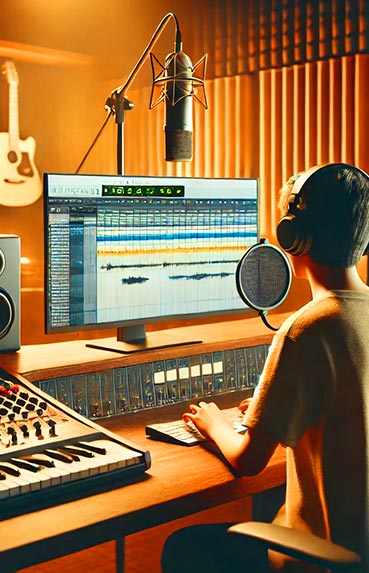Music has always been a powerful tool for expressing emotions, conveying messages, and connecting with others on a deeper level. Nowadays, personalizing a song to thank someone special has become a growing trend, and it's no surprise. These personalized compositions not only capture the essence of what we want to express but also create an indelible memory for both the recipient and the creator. We'll explore how and why these personalized songs are such a meaningful way to show gratitude.
The Power of Music in Expressing Gratitude
Music is a universal language that transcends cultural and linguistic barriers. It has the ability to evoke deep emotions and create connections between people.
The Science Behind Music and Emotions
Studies have shown that music directly affects the human brain. When we listen to music we like, our brain releases dopamine, a neurotransmitter that generates feelings of pleasure and well-being. This biological response explains why a song can make us feel happy, sad, or nostalgic in a matter of seconds.
A study published in the journal Nature Neuroscience revealed that music activates the same areas of the brain associated with pleasure derived from food, sex, and other rewarding activities. Therefore, using music as a means to express gratitude can amplify the positive emotions associated with this gesture.
Music as a Medium for Emotional Connection
A personalized song has the ability to communicate what words sometimes cannot express. Through carefully crafted lyrics and a moving melody, feelings of appreciation and love can be conveyed in a way that reaches the heart of the listener.
Personalizing a song to thank someone special not only demonstrates dedication and effort but also reflects a deep understanding of the person to whom it is dedicated. It's a way of saying "I know you" and "I value what you do for me" in a unique and unforgettable manner.
Creating a Personalized Song
The process of creating a personalized song may seem overwhelming at first, but with a structured approach and some practical tips, anyone can achieve it.
Identifying the Central Message
Before starting to write a song, it's important to define the central message you wish to convey. What exactly do you want to thank them for? Is it for a specific act of kindness, years of friendship, or unconditional support during difficult times?
Some steps to identify the central message include:
- Reflect on your relationship with the person: Think about significant moments you've shared together and the qualities you value most in them.
- Write a list of thanks: Note down everything you would like to thank this person for. This list will be the basis for developing the lyrics of your song.
- Choose a main theme: Once you have your list, select the gratitude you find most significant as the main theme of the song.
Writing the Lyrics
The lyrics of a personalized song are the heart of the composition. They should be authentic, emotional, and specific. Here are some tips for writing impactful lyrics:
- Be personal and specific: Instead of using generic phrases, incorporate specific details that only you and the person receiving the song will understand. This will make the song more special and meaningful.
- Use emotional language: Don't be afraid to show your emotions. Phrases like "your support has given me strength" or "your smile lights up my days" can have a great impact.
- Create a clear structure: A song typically has a verse, chorus, and bridge structure. Ensure that each part of the song flows naturally into the next.
Musical Composition
The melody and rhythm of the song are as important as the lyrics. Here are some tips for musical composition:
- Choose an appropriate musical style: Think about the musical genres the person you're dedicating the song to enjoys. This will not only make the song more enjoyable for them but also show that you know their tastes.
- Keep a simple melody: A simple and catchy melody is easier to remember and sing. Don't complicate things with complex arrangements unless you feel comfortable with them.
- Use instruments you are familiar with: If you play an instrument, like the guitar or piano, use it to create the base of the song. If you don't play any instrument, consider using music composition apps that offer pre-recorded tracks.
Tools and Resources for Song Creation
Today, there are numerous tools and resources that can facilitate the process of creating a personalized song.
Music Composition Apps
With the advancement of technology, composing music has never been so accessible. There are apps and software that allow anyone, regardless of their skill level, to create quality songs.
- GarageBand: This app, available for Apple devices, is perfect for beginners. It offers a wide range of virtual instruments and loops you can use to create your song.
- FL Studio: Known for its intuitive interface, this software is ideal for those who want to have complete control over every aspect of musical composition.
- BandLab: This online platform allows collaboration with other musicians and sharing your compositions. It's an excellent option if you're seeking feedback from other artists.
Personalized Song Services
If the idea of composing your own song feels overwhelming, consider hiring a professional personalized song service. These services allow you to work with experienced composers and musicians to create a custom song.
Some popular services include:
- Songfinch: This platform connects clients with professional musicians who create personalized songs based on the information provided.
- Custom Songs: They offer personalized compositions in various genres and styles, ensuring a final product that reflects your wishes and emotions.
Personalized songs have become a popular option for celebrations, birthdays, and special occasions, providing a unique and unforgettable gift.
Examples of Personalized Songs to Say Thank You
To inspire you in your own creation, here are some examples of personalized songs that have touched the hearts of those who received them.
Example 1: Thanking a Mother
A daughter wanted to thank her mother for all the unconditional support she had provided over the years. The song began with a description of childhood, recalling specific moments they shared together, and ended with a powerful chorus that said: "Thank you for being my guide and my refuge".
Example 2: Thanking a Friend
A young man wanted to show his gratitude to a friend who had been by his side during the toughest times. The song's lyrics included funny anecdotes and moments of personal growth, concluding with a chorus that said: "You're my brother from another mother".
Example 3: Thanking a Partner
A man decided to surprise his partner with a personalized song to celebrate her birthday. The song narrated their love story from their first meeting to the present, with an emotional bridge that highlighted: "With you, every day is a new beginning".
Tips for Performing and Presenting the Song
Once you've created your personalized song, it's important to consider how you'll present it to the special person. Here are some tips to ensure the performance is memorable.
Preparation and Rehearsal
- Practice in advance: Make sure you are familiar with every part of the song. Practice the performance several times to feel more confident and relaxed.
- Record a practice version: Listening to a recording of your performance will allow you to identify areas for improvement and adjust details before the final presentation.
Choosing the Right Moment
The right time and place can make the song presentation even more special.
- Choose a meaningful moment: Consider presenting it on a special day, like a birthday, anniversary, or important celebration.
- Select an intimate setting: A quiet and intimate environment will allow the person to focus on the song and the message you wish to convey.
Live or Recorded Presentation
Decide whether you prefer to perform the song live or record it in advance.
- Live performance: Offers a more personal and direct experience. Make sure to have the appropriate equipment, like a microphone and speakers, if necessary.
- Recording: Provides the possibility to edit and perfect the performance before sharing it. Additionally, the person can listen to the song as many times as they wish.
Creating a personalized song to thank someone special is a rewarding process that not only allows you to express deep emotions but also strengthens the bond with the person to whom it is dedicated. By following these tips and techniques, you'll be well on your way to creating a musical piece that will leave a lasting impression.

















